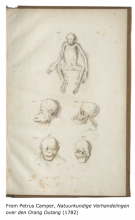- Thursday, September 27, 2018 - 5:30pm to 6:30pm
Class of 1978 Orrery Pavilion, Kislak Center for Special Collections, Rare Books and Manuscripts
Van Pelt-Dietrich Library, Sixth floor
The 2018 A.S.W. Rosenbach Lectures in Bibliography - Fossils, Apes, Humans: A Chapter in the History of Science, Revisited
Speaker: Carlo Ginzburg, Professor Emeritus, Scuola Normale Superiore, Pisa
Monday, September 24: "Paleontology and Connoisseurship"
Tuesday, September 25: "Gods, Humans, Apes: Art History and Evolution"
Thursday, September 27: "Medals and Shells: On Morphology and History, Once Again"
Please register to attend here.
Today we regard paleontology and connoisseurship as very distant spheres of knowledge. But are they not sharing a commitment to the decipherment of clues, either natural or cultural? This somewhat speculative argument can be substantiated by two historically connected case studies, focusing on the trajectories of two friends, Petrus Camper (1722-1789) and François-Xavier de Burtin (1743-1818). The former, a well-known Dutch anatomist, was interested in painting and physiognomy. The latter, a much less known but very remakable figure, moved from the study of fossils to the study of paintings. Their relationship unveils an unknown chapter in the history of antiquarianism and connoisseurship.
Georges Cuvier (1769-1832) a leading figure of French (indeed, European) science, one of the founders of comparative anatomy, called himself "a new species of antiquarian": a striking, somewhat unexpected, although not original self-definition. But to understand its implications one has to retrace a complex intellectual trajectory (which includes both Camper and Burtin) that will lead to a new image of antiquarianism and its relationship with history, implying a partial revision of Arnaldo Momigliano's great essay "Ancient History and the Antiquarian" (1950). Ultimately, this reflection will lead to a reflection on what history was, and what can become in the frail, threatened environment we live in.
Was it possible to articulate the idea of a descent of humans from big apes before Darwin? And if this has been the case, how? Through which cognitive instruments? Could either travel accounts or books dealing with political philosophy be read against the grain, playing the footnotes against the text? What is at stake is not a search for some forgotten forerunners of Darwin--an utterly useless, misleading notion--but, on the contrary, the possibility to reflect on the deep discontinuity between Darwin's project and natural history before him. From this discontinuity some visual and textual roots of contemporary racism will emerge.
Carlo Ginzburg has been Professore ordinario di Storia delle culture europee, insegna at the Scuola Normale Superiore di Pisa since 2006. He is also Professor Emeritus in the Department of History at the University of California, Los Angeles. Among his many publications are Threads and Traces: True, False, Fictive (2006); The Night Battles: Witchcraft & Agrarian Cults in the Sixteenth & Seventeenth centuries(2002), and The Cheese and the Worms: the Cosmos of a Sixteenth-Century Miller (1980).
For more information: (215) 898-7088; jpollack@upenn.edu
FALL 2018 SCHEDULE
Sep. 17: Nicholas Herman (Penn): “The Book-Shaped Object in Renaissance Europe”
Sep. 24, 25, 27 - Rosenbach Lectures: Carlo Ginzburg (Scuola Normale Superiore, Pisa): Fossils, Apes, Humans: A Chapter in the History of Science, Revisited
- Sep. 24: “Paleontology and Connoisseurship”
- Sep. 25: “Gods, Humans, Apes: Art History and Evolution”
- Sep. 27: “Medals and Shells: On Morphology and History, Once Again”
Oct. 1: Whitney Trettien (Penn): “Digital Book History”
Oct. 8: Priyasha Mukhopadhyay (Yale): “Unread: A History of the Book in Colonial South Asia”
Oct. 15: J.M. Duffin (Penn): “Draining the Swamp of Arcane Legal Text: Reclaiming the Geography of Eighteenth Century Philadelphia”
Oct. 22: Katie Chenoweth (Princeton): “Printers’ Devices, or, How French Got Its Accents”
Oct. 29: Sarah Guérin (Penn): “On Ivory, Wax, and Paint: New Insights on Devotional Booklets”
Nov. 5: Margo Natalie Crawford (Penn): “The Textual Production of a Shared Black Edge”
Nov. 12: David Norbrook (Oxford): “‘But a copie’: Lucy Hutchinson’s Life in her Texts”
Nov. 19: Samantha Sommers (Ohio State): “Reading in Books”
Nov. 26: TBA
Dec. 3: Mitch Fraas (Penn): “Boilerplate: Documentation, Paperwork, and the Persistence of Form across the Early Modern and Modern Worlds”
Dec. 10: Arthur Kiron (Penn): “Hidden in Plain Sight: Christian Readers of Rabbinic Literature in the Colonial Americas”

 Department of English
Department of English
